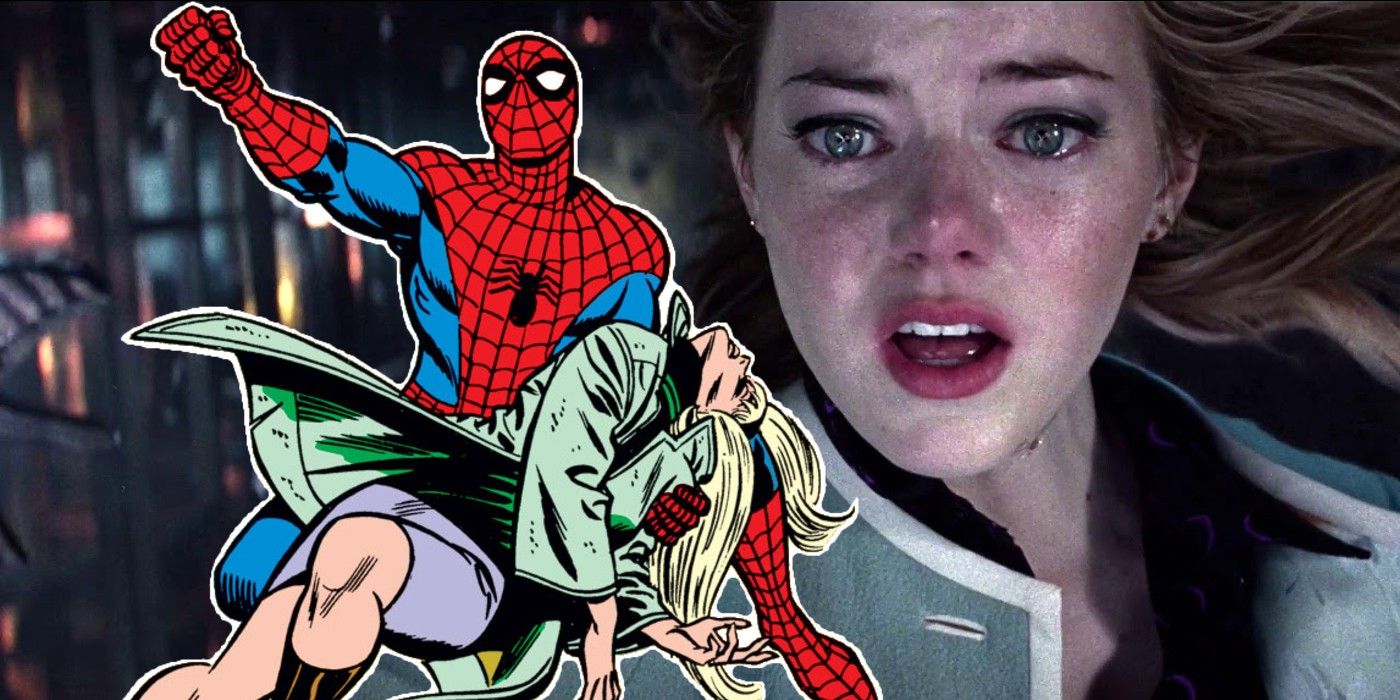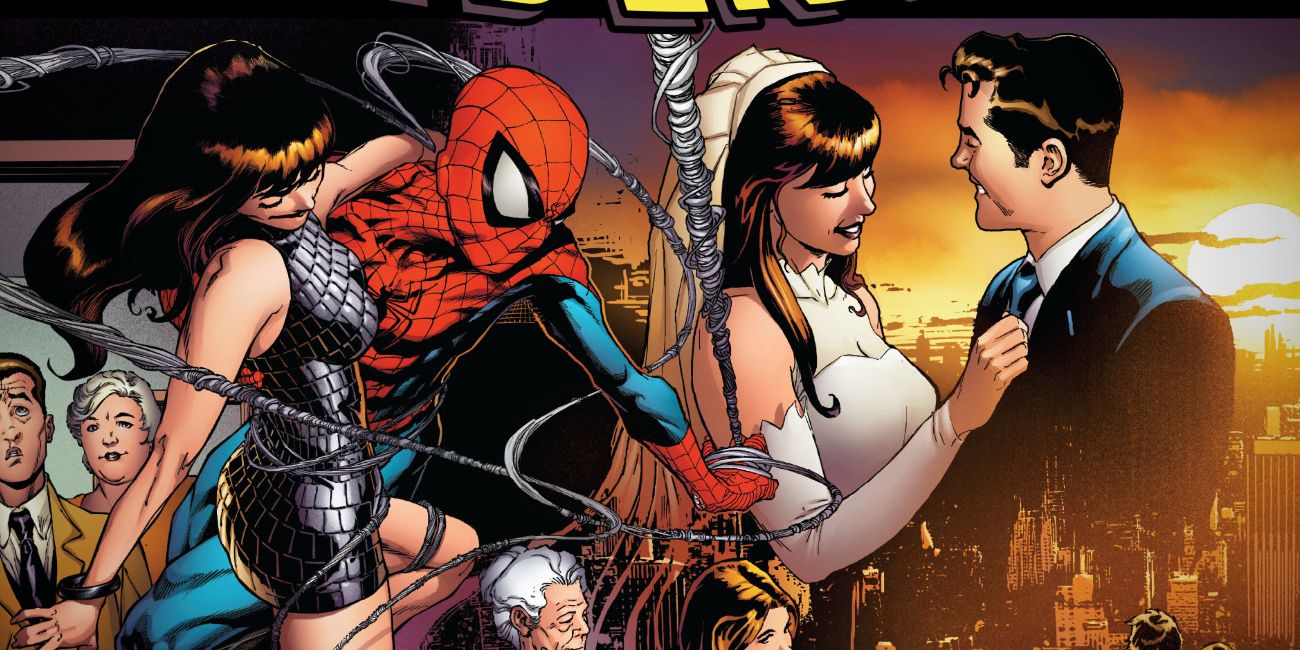The death of Gwen Stacy is perhaps the single most important moment in Spider-Man history next to the hero's tragic origin - but after 5o years, it's time for Gwen to come back. Among the many classic superhero love interests - Lois Lane, Pepper Pots, Steve Trevor, Betty Ross, etc. - Gwen Stacy remains the only major significant other to have died and not returned from the dead. This "permanent death," itself a rarity in comics, was seen as a major turning point in the industry...but ultimately, "The Night Gwen Stacy Died" did more harm than good for Spider-Man.
In comic books, death without any possibility of resurrection is almost always limited to characters who die via origin story: Thomas and Martha Wayne, Ho Yinsen, and Spider-Man's own Uncle Ben, to cite a few examples. This is also the reason why the well-worn phrase "Nobody stays dead in comics except Uncle Ben, Bucky Barnes, and Jason Todd" is horribly out of date: in 2005, both Barnes and Todd came back to life as dark anti-heroes. Gwen is the outlier; her death is seen as sacrosanct by fans and editors alike. Yet over the decades, Gwen Stacy continues to influence Spider-Man comics even after her untimely passing.
Amazing Spider-Man #121: The "Snap!" Heard 'Round The World
In 1973, Stan Lee had stepped away from writing Amazing Spider-Man books and had ceded the job to the new 20 year-old writer Gerry Conway. When Marvel editors considered killing Aunt May, Conway argued against the decision, claiming that removing her from the books gave Peter Parker one less person to worry about in his life. Ultimately he settled on killing Gwen Stacy in her place, because according to Conway "...she was a nonentity, a pretty face. She brought nothing to the mix. It made no sense to me that Peter Parker would end up with a babe like that who had no problems." Lee had no intention of killing Peter's first love, but by the time he learned of Conway's intentions, it was too late. Amazing Spider-Man #121, titled "The Night Gwen Stacy Died," was already in the hands of readers nationwide.
Reception to the issue was largely positive, but many readers were incredulous that Marvel would kill Gwen Stacy in such a sudden and surprising manner (and that Spider-Man even bore some responsibility by inadvertently causing her neck to snap when he caught her with his webbing, hence the 'snap' sound effect). The death shocked fans familiar with the conventions of the genre: superheroes simply did not fail to save their love interests back then, and it was a given that their lives were never in any real danger. Marvel even received death threats from angry fans; editors responded, saying "The relationship between Peter and Gwen had been through a lot of inconsequential ups and downs, and unless the two were to be married, there was nowhere else to take it. But marriage seemed wrong...the only logical resolution was tragedy." The story was burned into the minds of the Marvel faithful and comics fans in general, so much so that 2002's Spider-Man referenced the death at the climax of the film (albeit with Mary Jane instead) and 2014's The Amazing Spider-Man 2 recreated Gwen's death entirely, snap and all.
The Many Gwens of Marvel
But even after her death, Gwen's spectre lingered over the franchise, and writers couldn't help but tease her return - only to repeatedly dash the hopes of fans with every reappearance. Gwen's first "resurrection" turned out to be a clone of the original, created by the villain Jackal; the clone deteriorates soon after. Another clone was created by the second Jackal, appearing in Dead No More: The Clone Conspiracy, but the clone deteriorates again and is eventually killed in battle. Others would come in the form of illusions, dreams and hoaxes - often created by villains for the sole purpose of emotionally compromising Peter Parker (a plan seemingly shared by Marvel editorial, a fact not lost on savvy readers). Writers desperately wanted to bring the character back - even J. Michael Straczynski and Joe Quesada planned to resurrect Gwen at the end of 2007's contentious One More Day storyline - but Marvel wouldn't budge; Gwen's death seemed immutable. Thus, if editorial edicts prevented writers from telling Gwen's stories in the mainline Marvel universe, they would simply tell them elsewhere.
The first major alternate universe Gwen Stacy appeared in What if...Spider-Man Had Rescued Gwen Stacy? in Marvel's What If Vol. 1 #24, in which Gwen is saved, Peter proposes, and though his identity becomes public knowledge, Gwen vows to remain with him. Heroes Reborn's Gwen Stacy moonlights as Night-Gwen, Marvel's own version of Batgirl with all her crimefighting abilities. By far the best-known variant is Gwen Stacy as Spider-Woman, or Spider-Gwen. Hailing from a universe in which Gwen is bitten by the radioactive spider instead of Peter, the drummer-turned-superhero loses her Peter Parker and vows to use her powers as a force for good. Spider-Gwen is wildly popular with fans, appearing in the 2019 animated film Into the Spider-Verse and even crossing over into the main Marvel 616 continuity. Spider-Gwen's positive fan reception (and sales) clearly show an interest in the character - but not just because a What-If? story is an interesting thought experiment. Gwen very famously never found out that Peter was Spider-Man, and she believed - until her dying day - that her father was murdered by Spider-Man. Considering Marvel's penchant for filling Peter's life with conflict at every turn, this is a story that practically begs to be told.
Peter Parker, Eternal Teenager
When Marvel acquiesced to Gerry Conway's request to kill Gwen Stacy instead of Aunt May, they showed their hand: they were desperately afraid of Peter Parker growing up. An older Spider-Man, they reasoned, wouldn't resonate with their largest demographic - teenagers and young adults. When Conway insisted that Peter wasn't ready for marriage, he was talking about the reader as much as Spider-Man. Perhaps that sentiment might have held water in 1973, but not today; the readers have grown up. They've started families of their own, and deal with all-new problems that they never faced as teenagers. Yet Peter has stubbornly refused to advance in both age and maturity. Any small step forward (such as his 1987 marriage to Mary Jane) is followed by a giant leap back (2007's One More Day magically erasing said marriage). A more down-to-earth Gwen Stacy could do what the flighty Mary Jane never could: move Peter's life in a new, mature direction - perhaps emulating the lives of his fans from decades ago.
In 1963, Spider-Man held a unique place among superheroes as an ordinary teenager who faced the same problems as his readers (superheroics notwithstanding). But nowadays, other characters like Ms. Marvel and Miles Morales are more than capable of taking Peter's place as the "teenage hero" archetype. It is quite telling that Aunt May - Peter's past - was spared and Gwen Stacy - his potential future - was killed for the sake of retaining a key demographic, but that demographic is reading about the adventures of Miles and Kamala now. The demographic has moved on, and it's time for Peter Parker to do the same.
Stories about death in comic books are not necessarily about death, nor are they about loss. More often than not, they are about consequences. Gwen coming back from the dead wouldn't erase Peter's mistakes; the consequences (his pain, his guilt, the years Gwen missed) would still exist. Gwen Stacy's story has yet to be told. Peter Parker has yet to grow old. No doubt this would be a difficult endeavor, but if Marvel is brave enough, they would realize what fans have known for years: the best person for Spider-Man is, and always has been, Gwen Stacy.




